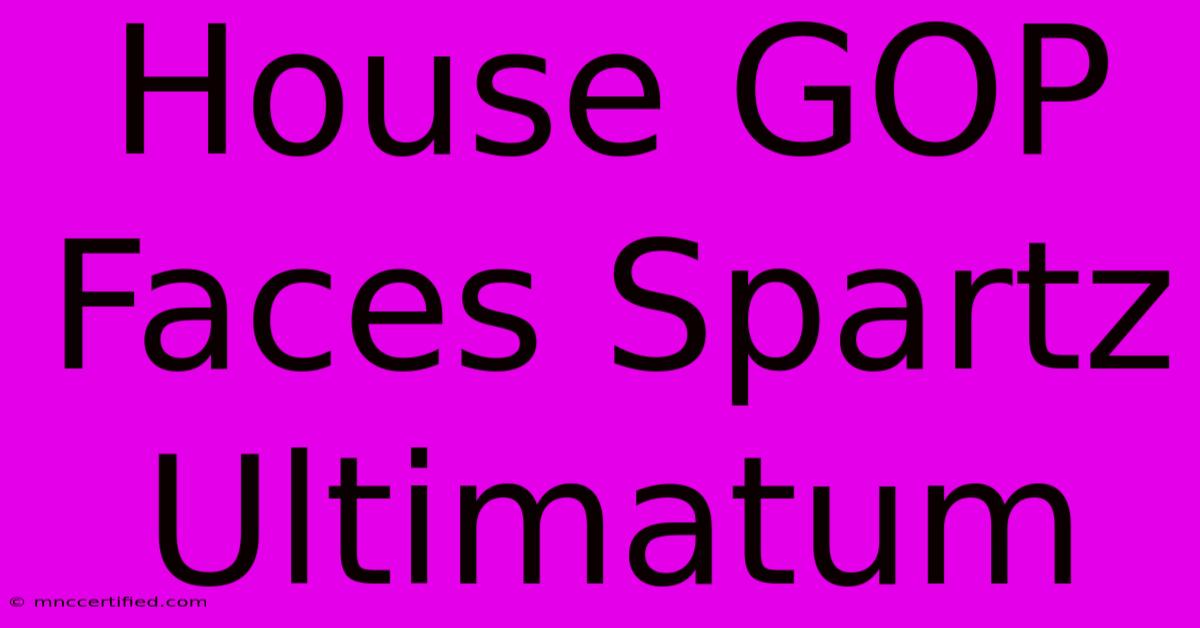House GOP Faces Spartz Ultimatum

Table of Contents
House GOP Faces Spartz Ultimatum: A Fight for Speaker and Party Unity
The House of Representatives is once again embroiled in internal conflict, this time centered around Representative Victoria Spartz and her ultimatum regarding the speakership. This situation highlights deep fissures within the Republican party and poses a significant challenge to their ability to govern effectively. Understanding the intricacies of this political standoff requires examining Spartz's demands, the potential consequences, and the broader implications for the future of the House GOP.
Spartz's Ultimatum: A Power Play or Principled Stand?
Representative Spartz, a Republican from Indiana, has issued a stark ultimatum to House leadership. While the exact details of her demands remain somewhat opaque, reports suggest they center around concerns about the current leadership's ability to effectively govern and unite the party. This isn't simply a matter of policy disagreements; it touches upon fundamental questions of party loyalty and the stability of the House Republican Conference.
Some interpret Spartz's actions as a power play, a calculated move to increase her influence within the party. Others view her stance as a principled stand against what she sees as ineffective leadership and a disregard for internal party harmony. The lack of complete transparency surrounding her specific demands fuels speculation and complicates analysis.
Key Questions Surrounding Spartz's Actions:
- What are Spartz's specific demands? The ambiguity surrounding this question is a key element of the ongoing drama. Until her demands are fully articulated, analyzing the situation remains challenging.
- What motivates Spartz? Is it genuine concern for the party's future, a personal ambition for greater power, or a combination of both?
- How much support does Spartz have within the Republican caucus? The level of support (or lack thereof) will significantly impact the outcome.
Potential Consequences: A Divided House
The ramifications of Spartz's ultimatum are far-reaching. A failure to resolve the situation could lead to several negative consequences:
- Further erosion of Republican unity: The ongoing internal conflict risks further fracturing the already fragile unity within the House GOP. This could paralyze legislative action and hinder the party's ability to achieve its policy goals.
- Damage to the Speaker's authority: The Speaker's authority is already challenged by the narrow Republican majority. Spartz's actions, regardless of outcome, weaken the Speaker's position and make governing even more difficult.
- Impact on legislative agenda: The ongoing internal squabbling diverts attention and resources away from pressing legislative issues, potentially leading to a stalled legislative agenda.
- Perception of dysfunction: The public perception of a dysfunctional and divided House Republican party could significantly harm the party's image and prospects in future elections.
The Broader Implications: Beyond the Speaker's Chair
This situation extends beyond a simple power struggle within the Republican caucus. It reveals deeper underlying issues within the party:
- Internal divisions: The conflict highlights significant ideological and strategic divisions within the Republican party, making it challenging to forge a cohesive legislative agenda.
- Leadership challenges: The situation underscores the ongoing challenges in Republican leadership and its ability to effectively manage internal conflicts and maintain party unity.
- Future of the Republican party: The outcome of this situation will have a significant impact on the future direction and trajectory of the Republican party, influencing its ability to compete effectively in future elections.
Conclusion:
The Spartz ultimatum represents a critical juncture for the House GOP. The resolution (or lack thereof) will profoundly impact the party's ability to govern, its internal unity, and its overall standing in the eyes of the public. The coming days and weeks will be crucial in determining the future trajectory of the House and the Republican party itself. Further developments will undoubtedly shape the political landscape for years to come. Continued monitoring of this situation and the responses of key players is vital for understanding its long-term effects.

Thank you for visiting our website wich cover about House GOP Faces Spartz Ultimatum. We hope the information provided has been useful to you. Feel free to contact us if you have any questions or need further assistance. See you next time and dont miss to bookmark.
Featured Posts
-
Djerf Responds To Public Criticism
Dec 18, 2024
-
Helen Rollason Bbcs Legacy
Dec 18, 2024
-
Earthquake Survivors Vanuatu Rescue Efforts
Dec 18, 2024
-
Cubs Pitcher Cody Poteet Scouting Report
Dec 18, 2024
-
Vanuatu Earthquake 14 Killed Rescue Underway
Dec 18, 2024